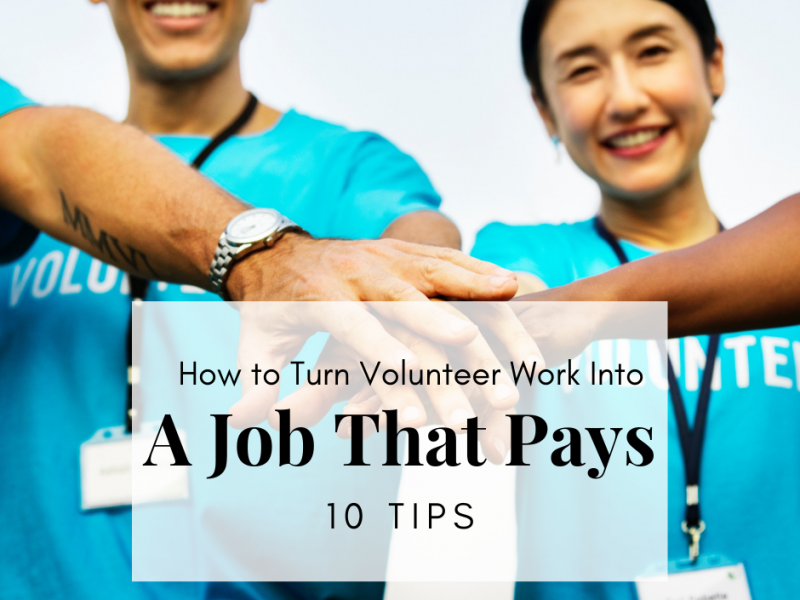Working as a volunteer, during times of unemployment is a proven job search strategy. It makes you an insider and creates the potential for landing paid employment with your volunteer organization. In this post, we’ll share 10 tips for leveraging volunteerism to create a paid job opportunity.
Why Volunteering is a Great Strategy for Your Job Search
Volunteering offers a slew of benefits for unemployed individuals in the job search. In addition to filling resume gaps and keeping you sharp, it will also help you gain the transferable skills needed to prove your experience. But what happens when your volunteer organization is also your target future employer? Well, the answer is simple: Use your volunteer time as a way to network internally and leverage your internal relationships, to land a job.
What this Looks Like in the Real World: Landing Your Dream Job Through Volunteerism
One of my clients had been splitting her time between the job search and volunteering at a non-profit after completing a year of service with AmeriCorps. Being no stranger to service from her recent AmeriCorps work, volunteerism was only a natural way to fill her time. Coincidentally, it was also a great networking strategy. She had spent 6 months in the job search with no luck. When the results didn’t roll in, she knew she needed some extra support.
Using Volunteerism to Uncover Your Passion & Find Career Fulfillment
Even though my client had been hunting for jobs, her passion was service-oriented work. She hoped to eventually become a paid employee of the non-profit where she was volunteering. She was even privy to the company job board but she wasn’t sure which route to take in the application process. What she really needed was help raising her hand for the job. She wasn’t exactly sure if she was qualified after analyzing the job description but she knew that she had the capabilities, passion and hunger to make the job hers.
Just Being an Awesome Volunteer Isn’t Enough. What it Takes to Land a Job with Your Volunteer Organization
With a little tweak of strategy to her resume, cover letter, and Linkedin and a whole lot of interview prep, she was able to communicate she was the right person for the job. Not only did she land the job, she also survived multiple interviews. To get to this point, she engaged the right contacts, and ultimately brought her job search to an end! Here’s how she did it. This is what you need to know about turning your volunteer work into an opportunity.
1. Prove Yourself First
A true volunteer, gives back without expecting anything in return. That’s the spirit you should adopt even if you are hoping to use volunteering as an entry point into the company. Many non-profits or volunteer-run organizations have tight budgets and won’t just hire anyone. Furthermore, anyone who’s spent time in the world of non-profit knows you need to be able to roll up your sleeves and pitch in. This is what the company needs to see. There’s no bigger turn-off for a volunteer supervisor than someone asking about jobs after only a short time volunteering. If you’re going to even contemplate landing a job, your supervisor and teammates need to see you are committed, hard-working and capable of being added to payroll.
2. Network Internally
The team you work with or support through your volunteer work is incredibly valuable for networking. Get to know everyone around you and raise your hand for projects that will expose you to different teams. This will show that you can start to build relationships that may serve you well. It’s all about who you know in the job search so make knowing everyone your mission. As you start to spend more time with these new contacts, you may even want to ask for an informational interview so you can ask more strategic career research questions.
3. Don’t Be Afraid to Speak Up
The powers that be know you signed on for volunteer work. They view you as a volunteer so don’t assume that they will know you are interested in a full-time job. You have to let them know you are interested. It’s not enough to just see job openings on the organization’s website. You have to express your interest. With larger, national organizations the job postings are probably being managed out of corporate headquarters. This means that the hiring powers likely have no idea who you are. When there’s an opening, don’t be afraid to speak up and make your interest known. Your supervisor can’t read your mind! However your supervisor can provide valuable guidance on how to navigate internal once he/she knows of your interest.
4. Advocate for Yourself
Raising your hand for the job opening may feel a bit awkward but it’s important to remember that the only person who can help you, is you. You are your best advocate. If you didn’t occur to your supervisor as first choice for the job opening, you’ll have to tell him/her why you are a fit. Here’s where your positioning comes into play. If you’ve demonstrated your capabilities for the role, and have been a force for good in your volunteer work, it won’t take much convincing. Try asking about the application process to spark the conversation. This will put your intent on your supervisor’s radar. Absolutely, indicate you have a sincere interest in the role as well.
I worked with Soozy of NG Career Strategy to revamp my ineffective resume. She started by gathering as much detail as she could about my experience and the type of job I was looking for. Her first draft was already heads and shoulders above what I started with. She continued to work with me to refine the resume, and by the time I reviewed the final product I was astonished at how accomplished and experienced I came across on the page. Since revamping my resume with Soozy, I have received my first interview this year. I look forward to more interviews! – Joy, Sales Professional, NYC
5. Leverage Your Relationships
If you’ve been networking from day one, you should have started developing relationships with some of the full-time employees. These are valuable relationships to tap into when you start to hear news of hiring for your target role. Grab a coffee with someone you respect and with whom you have rapport, within the company to learn about how they got their start and the best route to follow when applying. Make a point to book regular coffees, lunch, or chat time with people of influence. If the contact asks for more information about you, try sharing a 1-page networking brief instead of your resume. This will give them a sense of the types of companies and roles you are targeting. This simple strategy will then help them help you.
6. Follow the Suggested Process
Because every organization’s hiring process is unique, you’ll want to get some insight into the best way to apply. An online job board is not the best option but if this is the suggested process from your supervisor or internal contact, you have to go this route. However, there’s nothing wrong with asking for a referral. If you have a good relationship with your supervisor and they like your work, they should have no problem helping you out by shooting an email referral to the hiring manager letting them know your application is in the pipeline.
7. Leverage Your Work Ethic & Commitment
Unless fate is on your side, it’s unlikely that the absolute best-fit job will open up while you are volunteering. You may not be 100% qualified for the openings available but it doesn’t mean you can’t sell yourself based on your current stats. If you are a little under-qualified when compared to the job description, fear not. Your work ethic and demonstrated commitment to the organization already, are stellar qualities you can speak to in the interview process. Even your familiarity to the inner workings of the organization and it’s culture are a huge advantage when interviewing so be sure to talk this up as a major selling point.
8. Look the Part: Don’t Blow the Opportunity on Bad Branding
Once you’ve assessed your fit and received your supervisor’s buy-in, you want to take the time to get your brand all polished and ready to go. I’m of course referring to your resume and cover letter. While you may have an edge on an outsider in terms of who you know, you shouldn’t overlook the fact that you will still be compared against every person who is submitting an application for the job. If your resume or cover letter is out of date, difficult to scan, or lacking in visual cohesiveness, you may miss out on landing your dream job. Yes, your supervisor can help advocate for you with HR but no, they can’t make the ultimate hiring decision in most cases. Therefore you still want to treat this application submission as if you were an outsider applying cold.
9. Don’t rely on your ego to Land the Job. Interview Practice Necessary
So you’ve caught the attention of the hiring manager through careful networking and your interview is scheduled. Now is the time to get serious and prep your tail off so you don’t crack under interview pressure. Even if you feel you’ve already got this due to your familiarity with the organization, an interview is make or break time so treat it as you would any company and practice practice practice. The last thing you want to do is mess up and miss out now that you’re so close!
10. Be Authentic
If you struggle with interview nerves and ego is not the problem here, remember one important fact: you are passionate about the mission and have demonstrated that by volunteering. You’re good at what you do and are determined to pursue your passion. Be yourself! People hire people they like so your “authentic you” will go a long way!



 22 Transferable Skills & Resume Gap Fillers to Gain from Volunteering
22 Transferable Skills & Resume Gap Fillers to Gain from Volunteering


